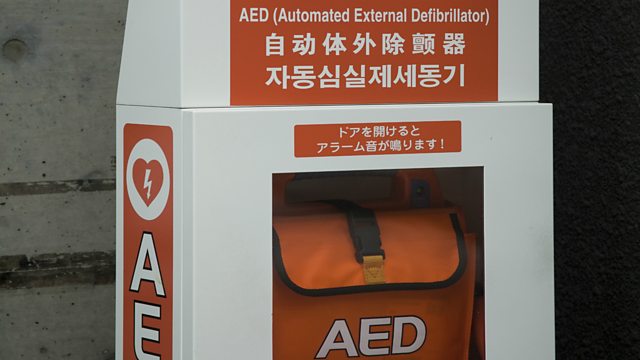Public Reluctant to use Life-saving Defibrillators
Passers-by are often reluctant to use defibrillators when someone has a cardiac arrest; menstrual cups empower Kenyan teenagers; could sleep save your life?
Many people don’t have the confidence to step in and give someone in cardiac arrest the electric shock which might save their life – despite the increased availability of automated public defibrillators. Nearly a third of people who die every year die from cardiac arrest – which is when the heart stops beating. Doctors want more people to use the automated devices which deliver clear audio instructions and are often found in railways stations or airports.
A menstrual cup is an alternative to sanitary towels or tampons that’s transforming the lives of teenage girls in Kenya. Some girls who couldn’t afford sanitary protection used rugs or mattresses – and worried about leakage. Others had “boyfriends” who would buy them pads – in return for sex. Now they have been given menstrual cups, they can stay in school to finish their education.
Most of us aren’t getting enough sleep – and it’s affecting our health and life expectancy according to Professor Matthew Walker, whose book Why We Sleep is published this week. He has a family history of cardiovascular disease – and does everything he can to protect his sleep in order to reduce his own risk of premature death.
(Photo: Getty Images)
Last on
More episodes
Clip
-
![]()
Menstrual cups are helping Kenyan girls stay in school
Duration: 01:09
Broadcasts
- Wed 27 Sep 2017 19:32GMT±«Óătv World Service except News Internet
- Thu 28 Sep 2017 02:32GMT±«Óătv World Service Americas and the Caribbean
- Thu 28 Sep 2017 04:32GMT±«Óătv World Service except Americas and the Caribbean, East and Southern Africa, News Internet & West and Central Africa
- Thu 28 Sep 2017 06:32GMT±«Óătv World Service East and Southern Africa
- Thu 28 Sep 2017 13:32GMT±«Óătv World Service Australasia
- Sat 30 Sep 2017 23:32GMT±«Óătv World Service East and Southern Africa & West and Central Africa only
Podcast
-
![]()
Health Check
Health issues and medical breakthroughs from around the world.



